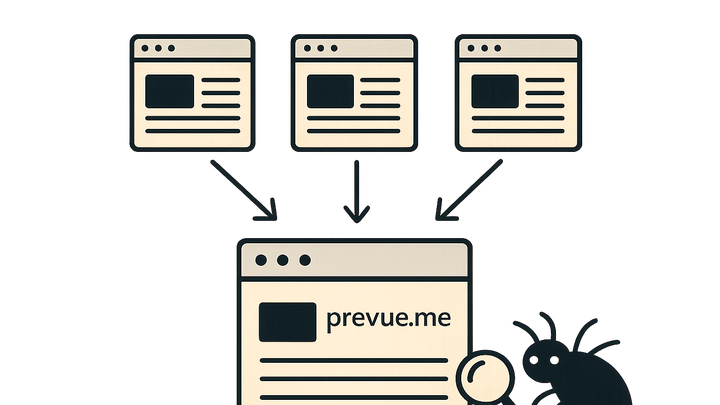Published on 2025-06-29T21:31:11Z
What is a Canonical URL? Examples and Best Practices
A canonical URL is an HTML element or HTTP header instruction that tells search engines which URL is the authoritative version when multiple pages contain similar or duplicate content. In CRO, SEO, and UX critiques, ensuring correct canonicalization prevents diluted ranking signals across page duplicates and improves user navigation by consistently directing visitors to the preferred page. Without a canonical URL, search engines might treat parameterized or session‐based URLs as separate pages, wasting crawl budget and potentially harming your site’s visibility. Proper canonicalization also avoids content duplication penalties and ensures that social shares and backlinks point to the same URL, enhancing domain authority. Tools like Prevue.me can scan your website for missing or misconfigured canonical tags, offering prioritized, actionable recommendations to maximize lead generation, improve accessibility, and optimize conversion rates. By implementing and auditing canonical URLs systematically, you maintain a cleaner site architecture, streamlined user journeys, and stronger SEO performance.
Canonical url
A canonical URL directs search engines to the authoritative page among duplicates, consolidating SEO value and improving UX.
Understanding Canonical URLs
Canonical URLs are used to tell search engines the preferred version of a web page when similar or duplicate content exists. They can be implemented via HTML link elements or HTTP headers.
-
Definition
A canonical URL is the designated preferred URL you want search engines to index when multiple URLs contain the same or similar content.
-
Rel=canonical element
The
rel="canonical"link element in the<head>identifies the canonical URL. For example:<link rel="canonical" href="https://example.com/page" /> -
Http header canonical
For non-HTML resources like PDFs, you can set a canonical URL via the HTTP
Linkheader:Link: <https://example.com/document.pdf>; rel="canonical"
Why Canonical URLs Matter
Canonical URLs are critical for SEO and UX by preventing duplicate content issues, optimizing crawl budgets, and ensuring consistent user experiences.
-
Prevent duplicate content
Ensures search engines index the preferred version and avoid splitting ranking signals across duplicates.
-
Optimize crawl budget
Reduces wasted crawling on duplicate pages, focusing bots on unique, valuable content.
-
Maintain consistent ux
Helps users and external sites link to the correct version of your content, boosting reliability and shareability.
Best Practices for Canonical URLs
Follow these guidelines to implement canonicals effectively and avoid common mistakes.
-
Use absolute urls
Always specify the full URL in canonical tags to avoid confusion by search engines.
-
Self-referencing canonicals
Include a canonical tag pointing to itself on the canonical page to reinforce the preferred URL.
-
Avoid chains and conflicts
Ensure your canonical tags point directly to the final URL without multiple redirects or conflicting signals from sitemaps and redirects.
Common Pitfalls and How to Fix Them
Identify typical canonical misconfigurations and solutions to maintain SEO health.
-
Missing canonical tags
Scan for pages without canonical tags and add them to avoid duplicate content issues. prevue.me can automate this process.
-
Conflicting signals
Resolve cases where XML sitemaps, hreflang tags, robots.txt rules, or 301 redirects conflict with your canonical tags.
-
Parameter handling issues
Canonicalize parameterized URLs to their clean version to prevent indexing of unnecessary variations.
Leveraging Prevue.me for Canonical Audits
prevue.me provides actionable critiques to detect and prioritize canonical URL issues, improving CRO, SEO, and UX.
-
Automated canonical detection
prevue.me automatically scans your site for missing or incorrect canonical tags and highlights them in the report.
-
Actionable recommendations
Receive step-by-step instructions on how to fix canonical issues and optimize your pages for better lead generation.
-
Prioritization of fixes
prevue.me ranks canonical URL issues by impact score, helping you focus on high-value improvements first.
